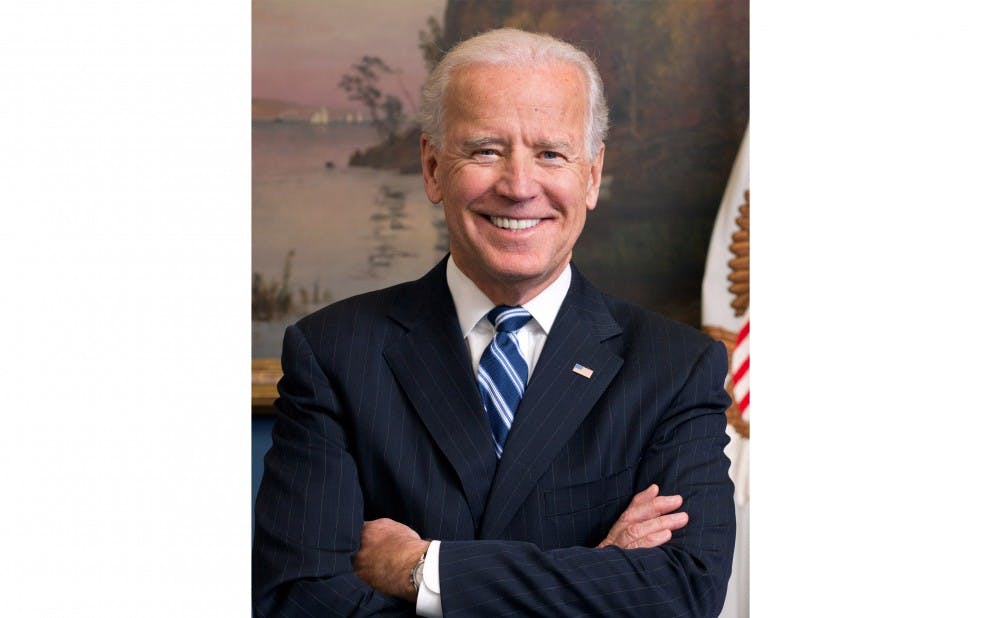Vice President Joe Biden will visit the Duke Cancer Institute Wednesday to discuss his new cancer initiative with Duke scientists and leaders.
Biden initially promoted “an absolute national commitment to end cancer as we know it today” in his speech in October announcing he would not run for president. President Barack Obama formalized the government-led push to cure cancer in his State of the Union address Jan. 12, when he called on Biden to lead the $1 billion National Cancer Moonshot initiative—which aims to accelerate progress in cancer research through increased funding to the National Institutes of Health and cancer centers around the country.
Biden will host a round table discussion Wednesday with oncologists, researchers and community and public health leaders in the area, said Don Graves, deputy assistant to the president and counselor to the vice president, in a press call Tuesday.
“The goal of the moonshot is really to make a decade’s worth of advances in five years and put us on a path to end cancer as we know it,” Graves said. “[Biden is] encouraged by the research that’s being done all around the country and in particular the research that’s going on at Duke.”
In addition to increasing data sharing, the initiative focuses on the development of some of today’s most cutting-edge approaches to studying and treating cancer, specifically immunotherapy, combination therapies and genetic screening for early detection. Graves explained that during his visit to Duke, Biden will also be touring select laboratories.
Dr. Darell Bigner, director of Duke’s Preston Robert Tisch Brain Tumor Center, said that Nobel laureate Paul Modrich, James B. Duke professor of biochemistry, and Dr. Matthias Gromeier, associate professor of neurosurgery, were chosen to meet with Biden—Modrich for his work in DNA mismatch repair processes and Gromeier for his research on using poliovirus to treat brain tumors. Gromeier’s innovative immunotherapy approach, which works by injecting genetically engineered poliovirus into the brain and recruiting the body’s immune system to fight the cancer, is currently in clinical trials at Duke for the treatment of glioblastomas.
“We’re at a potential paradigm shift in treating cancer right now, because immunotherapy has finally come of age,” Bigner said.
In addition to the poliovirus, Bigner added that other agents and viruses are being studied for their potential in treating cancer.
“It’s just in its infancy,” he said. “There still needs to be a lot of research done—basic research on how to turn the immune system back on in cancer, and a lot of clinical research in learning how to use these new agents.”
Graves said that Biden has already heard from many cancer survivors, oncologists, researchers, scientists and cancer advocates since beginning his efforts.
The chair of the White House Cancer Moonshot Task Force, Biden also visited the University of Pennsylvania’s Abramson Cancer Center in January to meet with its researchers. The cancer moonshot task force, which held its first meeting Feb. 1, is charged with focusing private-sector efforts and making the most of the federal government’s investments. Members of the task force include the heads of the Departments of Defense, Commerce, Health and Human Services, the NIH and the National Cancer Institute, among other federal departments and agencies.
Biden’s initiative is predicated on the idea that cancer research is currently poised to make huge leaps towards achieving cures, due to innovation in research.
“The Vice President believes strongly that we’re at an inflection point in research and that science is ready,” Graves explained. “It’s really incumbent upon us to take advantage of this inflection point to advance that progress.”
The initiative will include $195 million in new research funding for Fiscal Year 2016 and $755 million in mandatory funds for cancer research at the NIH and the Food and Drug Administration in FY 2017.
“Funding is enormously important. There’ve been several times in the history of the NIH and federal government where they’ve tried to input large amounts of money to cancer research,” Bigner said. “Although cancer deaths are falling, we’ve not been in the position to make advances like in immunotherapy, so I’m very optimistic about this. It won’t come all at once but if we can keep steady progress we’re going to see a paradigm shift in the next few years in how we treat cancer.”
Amrith Ramkumar contributed reporting.
Get The Chronicle straight to your inbox
Signup for our weekly newsletter. Cancel at any time.

